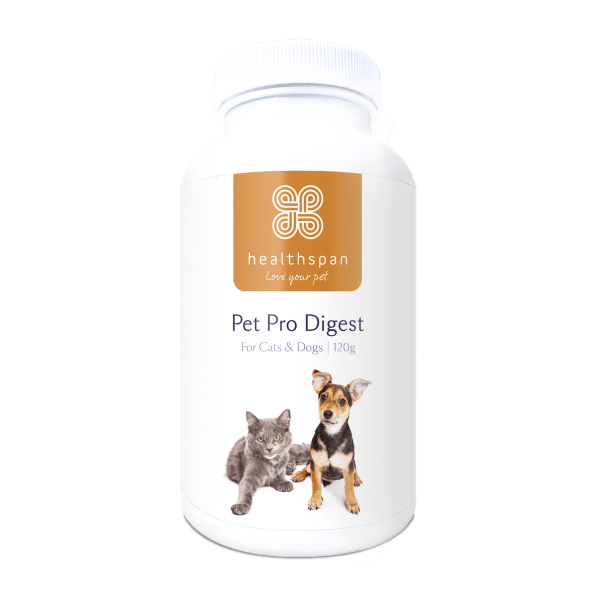Does your cat's tummy rumble ominously while they're asleep? Does diarrhoea plague your dog's days? Vet Joanna Woodnutt talks through some of our pets' most common stomach problems and shares the top ways we can help.
Types of upset stomach
'Tummy troubles' is a phrase that covers all manner of problems; vomiting, diarrhoea, constipation, wind, soft stools, abdominal pain and – my favourite – 'borborygmi' (rumbling guts). Dogs and cats can be plagued with one, some or all of these symptoms at the same time.
Breeds that are prone to upset stomachs
So, who can get tummy troubles? Well, not surprisingly, any breed, species, gender and age group – but some get it more than others. Puppies and kittens are particularly prone to problems due to an incomplete immune system, and as for breeds, Labradors (because they eat things they shouldn't), French Bulldogs (because a lot of them are born with intolerances) and German Shepherds (because they often get immune-mediated diseases) are all over-represented in my consulting room when it comes to stomach problems.
The early life of animals can play a large role, too. Severe diarrhoea in their youth (especially that caused by viruses such as parvovirus or parasites such as giardia) can strip the intestines of their lining and leave them vulnerable to later problems with digestion and open to further attack. Some animals – especially those born into environments with restricted outside access such as shelters – can grow up without ever getting sufficient numbers of 'good' bacteria to aid digestion.
Some pets may have good bacteria but are prone to picking up 'bad' bacteria. These bacteria, eaten accidentally by young animals (or older animals that pick up non-food items) can upset their guts. They replicate in the intestines, use up essential nutrients and spew out toxins to which the body reacts.
Caring for a pet with an upset stomach
If your pet suddenly develops diarrhoea, a visit to the vet is usually in order. Diarrhoea can quickly drain the body of fluids, and pets can go from well to ill within hours. This is especially true if the diarrhoea is particularly smelly, is paired with vomiting, or contains blood or black tar-like material.
Assuming the vet finds all is well, dietary changes, medication and probiotics are likely to be suggested. It's usually worth giving dogs a couple of days off from walks while they recover so that they can put energy into recovery instead.
For pets with recurrent or long-term troubles, changes at home can make a massive difference. Irritable Bowel Disease is a common cause of long-term tummy troubles in dogs and cats, and in this case dietary changes are likely to help.
Finding a diet that is specially formulated for sensitive stomachs is all that most pets require, although some may need restriction to a single protein source or even trialling of allergy-based diets.

Pet Pro Digest
Designed to promote the healthy balance of live 'friendly' bacteria in your pet's digestive system
- Supports your pet's digestive and dental health
- Bifidobacterium lactis, Enterococcus faecium and fibre
Probiotics and prebiotics
In these situations, using probiotics and prebiotics is extremely important. As discussed earlier, some pets struggle to keep 'good' bacteria in their gut. The 'bad' bacteria that replace them are not as efficient at digestion and can cause excessive gas production, as well as diarrhoea.
Using a probiotic and prebiotic daily 'feeds' the gut with the good bacteria; constantly trickling them in like this means that there is always an excellent supply of bacteria to aid digestion, as well as the things these 'good' bacteria need to thrive.
When the gut is inflamed, the body cannot absorb vitamins correctly. For dogs with short-term diarrhoea, this isn't too much of a problem – the body has stores of most vitamins. However, pets with loose faeces lasting a week or more quickly run out of vitamins. This is especially true of vitamin B12, which is important for all sorts of body functions, including for the gut cells to be able to absorb properly.
It's a vicious cycle, but can be easily remedied by supplementing vitamins as soon as tummy troubles continue for more than five days. Using vitamins and probiotics can reduce the severity of your pet's chronic tummy troubles and help to control flare-ups, but if your pet has recurrent problems it's always best to get them checked over by your vet to make sure there's nothing to worry about.







